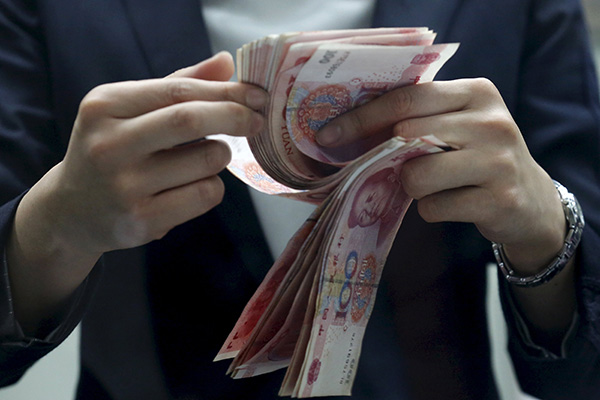IMF 'out of line' on China debt warning
 |
|
A clerk counts Chinese 100 yuan banknotes at a branch of a foreign bank in Beijing Jan 4, 2016. [Photo/Agencies] |
Since the early 1990s, some China watchers internationally have, one after another, predicted a scenario in which the Chinese economy would experience a major recession, although it never happened. Now they seem to have found new ammunition for their argument: the country's rising debt.
Following the downgrading of China's credit ratings in May by Moody's, which cited the possibility of the country's continually rising debts, the International Monetary Fund warned this month that China's credit growth was on a "dangerous trajectory".
"International experience suggests that China's credit growth is on a dangerous trajectory, with increasing risks of a disruptive adjustment," the IMF said in a report. The IMF called for "decisive action" from China and suggested it press on with reforms to cut its debt levels.
Indeed, such warnings deserve serious attention from policymakers since China does face the challenge of debt reduction. But it is crucial that China should not be misled by such a doomsday argument and cut its debt levels in haste only to jeopardize economic stability.
If stable economic growth cannot be maintained, it will in return affect the country's drive to cut debt levels.
"The IMF's conclusion, although it deserves our attention, is out of line with China's real situation," said Yu Yongding, an economist of the Chinese Academy of Social Sciences. "We should not adopt its suggestions."
Given its high deposit ratio, Yu told China Daily that the nation is very resilient in coping with its debt problem. If it rushes to solve its debt problem-which has been accumulated over a long duration of decades-in a hasty manner, it may risk dampening economic growth.
"We have taken a series of measures to solve the debt problem and they have been quite effective," he said.
According to the Ministry of Finance, China's government debt-to-GDP ratio is 36.7 percent in 2016, lower than most major industrialized and emerging-market economies.
The National Development and Reform Commission said this month that China's overall leverage levels had dropped by the end of 2016, compared with the end of the third quarter of 2016. It also said that by the end of June, the asset-to-liability ratio of major industrial enterprises had dropped to 55.9 percent from 56.7 percent a year earlier.
Yu said that once economic growth slows, leverage levels could go up. Therefore, China must well handle the tempo of debt level reduction so that efforts to cut debt levels would not be carried out too hastily to affect overall economic growth.
Financial policymakers should also be more tolerant toward enterprises with high debt levels if their operation remains on track, Yu said.
Against the backdrop of leverage cutting, some enterprises, thanks to their high debt levels, cannot continue to get access to bank loans and are forced to the brink of bankruptcy. "If their operation remains largely sound, they may only face the challenge of a temporary liquidity shortage. Banks should continue to extend loans to them and, as their operation goes back on track, they would gradually step out of difficulties and become solvent," he suggested.
In this way, such enterprises would be able to gradually cut their debt levels after their operations improve, contributing to debt reduction and overall economic stability, he said.






















